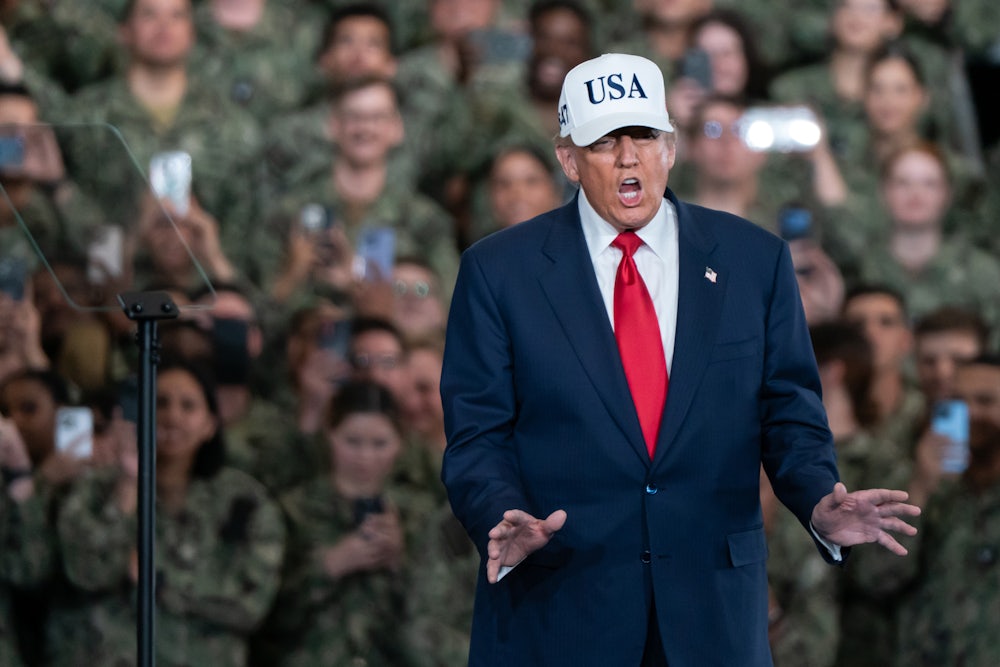President Trump is constantly ignoring democratic norms and the rule of law here at home, from sending the National Guard to U.S cities to having prosecutors file charges against his political enemies. But right now, some of his most alarming, unhinged moves have a target abroad: Venezuela. The administration is making clear that it will use any means necessary, including military force, to remove longtime President Nicolás Maduro. These actions break both U.S. and international law—and those of us committed to democratic principles must strongly oppose Trump’s approach.
I’m not here to defend Maduro, an autocrat who almost certainly lost the 2024 presidential election there but claimed victory and stayed in power. It was the policy of the Biden administration that Maduro should not be recognized as the leader of Venezuela.
But the Trump administration has gone much further than Biden, starting a low-grade war against another nation with almost no buy-in from Congress, the American public, or the international community. The list of steps taken by Trump against Venezuela over the last three months is long and aggressive. The administration has launched almost two dozen military strikes against fishing boats in the Caribbean Sea and the Pacific Ocean since September, claiming (without evidence) that these boats are part of Venezuela-led effort to smuggle drugs to the United States. Asked in a recent interview if Maduro’s days in power are “numbered,” Trump said yes, a troubling echo of how George W. Bush discussed Saddam Hussein two decades ago. Several U.S. aircraft were flown near the Venezuelan coast last week, a tactic likely used to intimidate Maduro’s government.
The administration this week formally designated Maduro and his allies in power as a terrorist group, making it easier to justify the use of military force against Venezuela. The administration has confirmed reports that the CIA will soon conduct operations inside Venezuela. These operations are technically supposed to be “covert,” but Trump’s team is essentially broadcasting this strategy to The New York Times and other new outlets.
While Trump and his aides haven’t stated this openly, their policy certainly seems to be that either Maduro will give up power under U.S. pressure or the United States will remove him. All of this feels like the run-up to the Iraq War.
I would never defend the Iraq War, but at least Congress, the broader American public, and the international community openly debated that policy before the U.S. invaded Iraq. Not here. This bellicose posture toward Venezuela is entirely driven by the administration with little consultation with anyone else. It’s true that presidents in both parties in recent decades have ignored the fact that it’s literally written in the Constitution that Congress, not the president, is supposed to formally declare when the United States is at war. But what Trump is doing has less accountability than, say, Barack Obama expanding the use of drone strikes in the post–September 11 period, when leaders in both parties and the American public were very committed to killing potential terrorists.
In a recent CBS News poll, 76 percent of Americans, including 64 percent of Republicans, said that the administration needs to provide a clear rationale for its actions in Venezuela. Only 13 percent of Americans viewed Venezuela as a “major threat” to U.S. national security.
And all of the misleading statements from the administration about Maduro undermine the campaign against him and also echo Iraq in some ways. As was the case with Saddam Hussein, there is plenty to oppose about Maduro without wrongly implying that he is sponsoring terrorism. Almost no one believes the Trump administration’s claim that randomly killing people on fishing boats is part of a smart way to combat drug smuggling. It is hard to imagine that the Trump administration sincerely cares about Maduro ignoring election results—that’s what Trump did himself in 2020. And the administration is very allied with Jair Bolsonaro of Brazil, who also attempted to stay in power after losing an election.
“The Trump administration’s policy of destroying fishing boats allegedly carrying drugs and killing people without due process or providing any evidence constitutes a radical departure from the U.S.’s traditional approach in combating the maritime drug trade in Latin America,” says Michael Shifter, a professor in Georgetown University’s Center for Latin American Studies.
What I suspect is really driving this policy is other factors that shouldn’t be shaping America’s foreign affairs. Trump seems to personally hate Maduro, dating back to his first term. Secretary of State Marco Rubio is aligned with the sizable anti-Maduro contingent in Florida from his time as a politician there. María Corina Machado, the leader of Venezuela’s opposition, has praised Trump since she won the Nobel Peace Prize in October. She would be a major force in a post-Maduro Venezuela, giving the Trump administration a much stronger foothold there. And if Trump successfully forces out Maduro, Machado would likely push hard for Trump to be awarded the peace prize, which he covets.
No one should want Maduro to stay in power. But what we really shouldn’t want is Donald Trump, the autocrat who currently controls the most powerful military in the world, essentially choosing which other leaders get to stay in power and which ones don’t according to his own whims. American-led regime changes have a horrible track record. That record will only get worse if such regime changes are led by Donald J. Trump.
